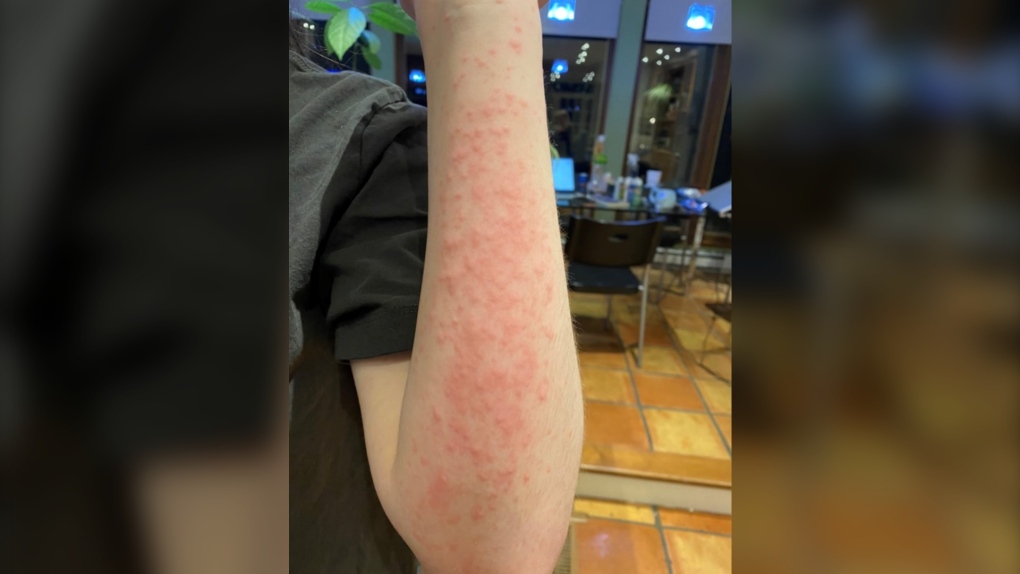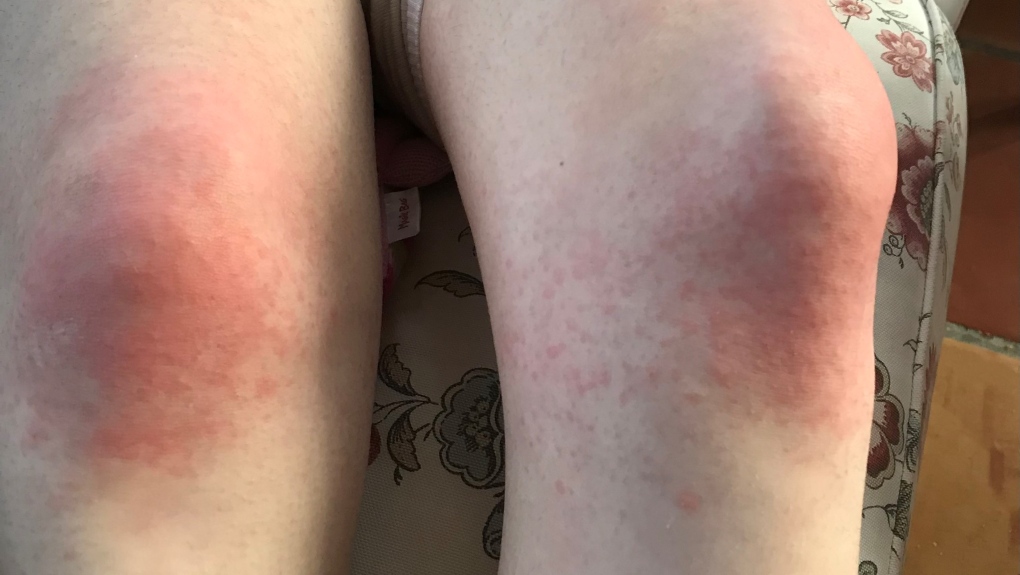Think you hate the cold? Meet the Montreal girl who's 'allergic' to it
Eryn Margolese’s routine before going outside this time of year would sound familiar to a lot of Montrealers.
“Depending on how cold it is, I'll wear two pairs of pants,” says the 15-year-old. “And I'll always wear, like, long sleeves, jackets, hat, gloves, scarves—everything.”
Nobody likes to be cold. But for Margolese, it’s not quite the same thing.
In 2020, she started getting a strange rash at odd times: raised, itchy red bumps on her skin that could take hours to go away. She tried to ignore it.
“I didn’t really know what was happening,” she said. “I just had some rash, and I was like ‘OK, that’s weird,’ and then it kept happening and I had no idea what it was.”
Finally, she went to “a bunch of doctors” and they tried to help. Maybe it was a kind of soap or laundry detergent she was reacting to, they theorized. But she hadn’t been using any new products.

Finally, an allergist at the Montreal Children’s Hospital had a new idea.
Dr. Moshe Ben-Shoshan took an ice cube and put it on Margolese’s arm. The rash quickly appeared, and he knew exactly what the problem was.
In such “ice cube tests,” he explained, “we wait five minutes and then we observe the development of hives aftewards.”
Margolese had come with a story he recognized, he said—“a classic story of going swimming or going outside in cold weather and developing hives.”
He broke the news to her: she was allergic to chilly temperatures, more or less, with a condition called cold urticaria. It’s not exactly an allergy, but a reaction to cold that looks a lot like an allergy and can even produce life-threatening anaphylaxis.
It affects about 30,000 Canadians, most of them young people, Ben-Shoshan told CTV News.
“Any one of us will get redness where we put the ice cube, but this patient will get hives,” he said.
“It looks like an allergy because you get the hives. But the trigger is not an allergen like peanut or… pollen,” he said.
“Basically the exposure to cold is assumed to generate an auto-allergen, so a substance that your immune system reacts to.”
Doctors are still trying to understand the condition, but it’s the substance produced within the sufferers’ bodies that creates the skin reaction.
“When you think about an allergy, you try to look for an external trigger that you can remove from your environment, like you know, a food… or a cat or a dog,” the doctor explained.
“This is different," he said. "In order to control it you need to control your internal environment by keeping your temperature warmer, by protecting your exposed surface areas, by taking antihistamines and in cases that are more severe,” having an epinephren injector.

For Margolese, the news was hard to hear. One of her main triggers wasn’t winter weather, but being at summer camp and swimming or boating every day in a cold lake, which she loved.
Now, she can’t do that the same way. She has to wade slowly in and pay attention to her reactions, Ben-Shoshan said—jumping in is not an option.
Anaphylaxis is rare in people with cold urticaria, with a review of 10 years of research showing it can happen in about 20 per cent of patients. But when such a severe reaction happens, it’s usually from quickly plunging into cold water or other very sudden temperature changes.
Margolese also takes antihistamines every day now and carries an emergency injector. Montreal winter also poses some special problems, she says.
“I'll sometimes walk my dog, but it'll be a much shorter walk and I'll go outside less,” she said.
Other things are surprising. She can eat cold treats like ice cream, but can’t necessarily hold onto a cold drink for a long time without protecting the skin on her hands.
The Montreal Children’s Hospital said in a release that the disorder affects girls slightly more commonly than boys.
Ben-Shoshan said the condition is more common in northern latitudes, including in Canada. It can last for a long time, often 10 years or more, and while for some people it goes away, for others it can last for life.
Margolese says that now that she’s had some time to live with the new precautions, she’s “used to it,” though not happy about having to give up cold pools and lakes.
And in winter, if Margolese’s family used to have to remind her, like many teens, to wear gloves or zip up her jacket, those days are long gone.
“I was never too cautious in the cold. It was kind of like if I'm walking from my house to my car, it's like whatever… having gloves is not a big issue,” she said.
Now, “I wouldn't slip up.”
CTVNews.ca Top Stories

Indian envoy warns of 'big red line,' days after charges laid in Nijjar case
India's envoy to Canada insists relations between the two countries are positive overall, despite what he describes as 'a lot of noise.'
Stormy Daniels describes meeting Trump during occasionally graphic testimony in hush money trial
With Donald Trump sitting just feet away, Stormy Daniels testified Tuesday at the former president's hush money trial about a sexual encounter the porn actor says they had in 2006 that resulted in her being paid to keep silent during the presidential race 10 years later.
U.S. paused bomb shipment to Israel to signal concerns over Rafah invasion, official says
The U.S. paused a shipment of bombs to Israel last week over concerns that Israel was approaching a decision on launching a full-scale assault on the southern Gaza city of Rafah against the wishes of the U.S.
Former homicide detective explains how police will investigate shooting outside Drake's Bridle Path mansion
Footage from dozens of security cameras in the area of Drake’s Bridle Path mansion could be the key to identifying the suspect responsible for shooting and seriously injuring a security guard outside the rapper’s sprawling home early Tuesday morning, a former Toronto homicide detective says.
Northern Ont. woman makes 'eggstraordinary' find
A chicken farmer near Mattawa made an 'eggstraordinary' find Friday morning when she discovered one of her hens laid an egg close to three times the size of an average large chicken egg.
Susan Buckner, who played spirited cheerleader Patty Simcox in 'Grease,' dead at 72
Susan Buckner, best known for playing peppy Rydell High School cheerleader Patty Simcox in the 1978 classic movie musical 'Grease,' has died. She was 72.
Jeremy Skibicki has 'uphill battle' to prove he's not criminally responsible in Winnipeg killings: legal analysts
Accused killer Jeremy Skibicki could have a challenging time convincing a judge that he is not criminally responsible for the deaths of four Indigenous women, a legal analyst says.
Bye-bye bag fee: Calgary repeals single-use bylaw
A Calgary bylaw requiring businesses to charge a minimum bag fee and only provide single-use items when requested has officially been tossed.
Alcohol believed to be a factor in boating incident after 2 men die: N.S. RCMP
Two Nova Scotia men are dead after a boat they were travelling in sank in the Annapolis River in Granville Centre, N.S., on Monday.
































